- Home
- Jim Thompson
Bad Boy Page 2
Bad Boy Read online
Page 2
It was just as well. I cannot remember the guy’s last name now, although I should, as many crime stories as I have written. But his spry mannerisms and his bright blue eyes had earned him the sobriquet, among the police of six states, of “Monkey Joe.” He was the southwestern outlet for a gang of Missouri car thieves who had hundreds of thefts, and, I believe, thirteen murders to their credit.
At the time the pinch was made Freddie, my other sister, had just been born, and we had other things than crime to talk about. But the magazine sections of the Sunday papers kept the case alive until we were less preoccupied. For weeks they were filled with the pictures and exploits of “Joe, the man with the monkey-blue eyes”—which may or may not explain why there was a sudden dearth of Sunday papers around our house.
Pop said there was no connection.
5
One day around the turn of the century, a large young man with the profile of President McKinley wandered into Territorial Oklahoma from Illinois. He had a certain ponderosity of manner which set none too well with his background. For, while he could be considered unusually well-read for his day, he had little formal education, and his working experience was confined to a few months as a railroad fireman and a year or so as a country schoolteacher.
He conferred with a highly placed Republican relative—Territorial Oklahoma was governed by Republicans—and this man got him an appointment as a deputy United States marshal. He did not ask for help after that, nor did he need it. For the young man’s chief talent was something he had been born with, the ability to make friends. And, I may as well say now, it was to prove no unmixed blessing.
When statehood came, he ran for sheriff in a solidly Democratic county and won by a landslide. He was re-elected for two successive terms, and, except for larger plans, could have held the office indefinitely. The ultimate objective of those plans was the presidency of the United States—for the man believed, and did until the day he died, that any man could be president. As a long step toward that goal, he won the Republican nomination for Congress from his district.
Here, at last, the man’s talent for friendship became a curse. A man’s best friends, once they turn upon him, become his worst enemies. It was so in the young man’s—I may as well say—my father’s case.
Pop’s honesty was something painful to behold. In the relatively minor office of sheriff, he had seen no occasion to discuss his early history and antecedents, nor to promulgate any but the most general of platforms. As a congressman, however, he felt that his constituents had a right to know all about him and what to expect of him as a legislator. Though it damned near killed him—and I mean that literally—he told them.
The great body of voters—men who had moved into Oklahoma from the deep south, men who had told each other fondly that “Ol’ Jim ain’t like the rest of them No’thuhnuhs”—heard him in shocked silence, then with purple-faced fury. They learned that the S in his middle name stood for Sherman, after General Sherman with whom his father had marched to the sea. They learned that the South, whether it liked it or not, was part of the United States, and the quicker it accepted the fact the better. They were told that, as a Republican, he stood for the absolute equality of all races, and that he would fight to obtain and maintain that equality.
Needless to say, Pop’s honesty cost him the most smashing political defeat in Oklahoma history.
Not only that, but it also made him a fugitive from justice for more than two years.
Like many other frontier peace officers, Pop had been decidedly careless in his official bookkeeping. He knew very little about such work, and he was too busy, or so he thought, running down outlaws. He knew that neither he nor his deputies had ever pocketed a penny of public funds. That being the case, what did it matter if, at the end of his third term, his books showed a technical shortage of some thirty thousand dollars.
As a matter of fact, it wouldn’t have mattered at all except for the debacle of his congressional campaign. Everyone knew he was honest. No one was going to make even an implied assault on a man with thousands of voters in his pocket. He planned, as soon as he had the time and money, to hire a corps of expert accountants and get the sheriff’s office mess straightened out. But the end of the congressional race found him without money, virtually without friends, and with an overwhelming host of enemies who intended to see that he was given no time to adjust his accounts.
Overnight, he was faced with criminal charges and the almost certain prospect of a long stretch in prison. Knowing of nothing else to do, he fled to Mexico.
What had been an unusually promising career was now, obviously, at an end. Since he could barely support himself, he was to all purposes permanently estranged from his wife and two small children. He had no money and no way of earning any except by competing on even terms with peon labor. Rather, I should say, uneven terms. The Mexican government had no love for Americans who took jobs from its own starving nationals.
I don’t know what other men would have done under such circumstances, but I can speak for myself: I’d have walked into the Rio Grande and kept on walking until my hat floated.
That wasn’t, of course, Pop’s way of doing things.
All man’s troubles, he decided, sprang from ignorance—in this particular case ignorance of law and accounting. He did not know enough, but he would henceforth. He would acquire the knowledge to solve this immediate difficulty, then go on to improve and expand his learning in every possible field.
Somehow, he managed to acquire the funds necessary for correspondence courses in law and accounting. During every minute he had free from drudgery, he studied. After some two years, he received an LL.B. degree by mail, as well as a certificate as an expert accountant. Meanwhile, he had got in touch with former intimates in Oklahoma. Feeling toward him had died down. If he wanted to come back, they’d stake him to expenses and also go his bond while he was fighting the case.
Pop went back. He audited his own accounts and then argued his own case in court. He proved that not only did he owe the county nothing but that the county actually owed him several thousand dollars.
Eventually, he became attorney and official accountant for the Oklahoma Peace Officers Association and developed a large private practice. But even when he was well on the road to success, his open-handedness and his reluctance to dun a client brought on long periods of financial destitution. During such times, Mom, Maxine and I resumed a practice we had begun when he fled to Mexico.
We went to live with Mom’s folks in a Nebraska country town.
6
I could say a great deal about the unpleasant features of living with relatives, of living in a gossipy small town where everyone knows your circumstances and has little else to talk about. But I have brooded overlong about these matters in other books (and out of them); so let us dismiss them with the statement that they did exist. Along with everything else, I often managed to have a wonderfully amusing time.
For this, for the attitude which enabled me to have it, I am largely indebted to my Grandfather Myers, the most profane, acid-tongued, harsh, kind, delightful man I ever knew.
I recall an evening when my ultra-pious grandmother had dragged me to a country revival meeting, and I lay shivering in my dark bedroom afterwards. I was too terrified to sleep. I was certain that my six-odd years of life—all spent in sinning from the preacher’s standpoint—had earned me one of the hotter spots in hell, and that I would certainly be snatched there before morning.
Then, though I had made no sound—I knew damned well what my grandmother would do if I waked her up—my grandfather crept in in his undershirt and trousers. “Can’t sleep, huh?” he jeered, in a harsh, mocking whisper. “Let some goddam fool scare the pee out of you, huh? Well, goddam, if you ain’t a fine one!”
He ordered me into my overalls and led me out of the house, pausing in the kitchen where he picked up a pint cup of whiskey toddy which he always kept warming on the back of the stove. We went out into the back ya
rd and sat down on the boardwalk to the privy. There, after each of us had had a mighty sip of toddy and I had been allowed a few puffs from his Pittsburgh stogie, he delivered himself of a lecture.
I cannot repeat it here, his acidly profane yet somehow hilarious discourse on certain types of religionists and the insanity of taking them seriously. Suffice it to say that, coupled with the toddy, it sent me into muffled gales of giggles. It sent me smiling to sleep, and left me smiling in the morning.
Having suffered the cruelest of childhoods himself, my grandfather believed that anything that contributed to a child’s peace of mind was good, and that anything that disturbed that peace was bad. I hold to that same belief. It is one of the very few things I do believe.
Grandfather, or “Pa” as he was known to the entire clan, was an old man from my earliest recollection—just how old even he did not know. Orphaned shortly after birth in a period of indifferent vital statistics, he had been handed around from one family to another, worked always, fed seldom, and beaten frequently. For all that his memory could tell him he had been born big, raw-boned and doing a man’s work.
He might have been fifteen when he enlisted as a drummer boy in the Union Army, but he believed he was nearer ten. By the end of the war he was a full-fledged sergeant, an inveterate gambler, a confirmed drinker and a stout apostle of the philosophy of easy-come easy-go. He didn’t know what he wanted to do, but he was certain that it must pay a great deal and have very little physical work attached to it.
There was no such vocation, of course, for a brash young man who could barely read and write. Back in his home state of Iowa, he worked for a few years as a stone mason, the only trade he knew, and usually gambled away his money as fast as he got it. When his luck at last changed for the better, he took the resulting several hundreds and went to St. Louis. There he sat in one of the big games for seventy-two hours straight, leaving at its end with more than ten thousand dollars.
He liked big things, simply for the sake of bigness, and about the intrinsically biggest business in those days, for the small capitalist, was hardware and farm implements. Pa bought out his hometown dealer in those things and set out, to all appearances, on the career of a prosperous and respectable merchant.
These appearances were deceptive. He was not respectable, by many definitions of the term, and any prosperity he may have enjoyed was as brief as it was accidental. He liked to gamble and carouse as much as he ever had. He felt a fatal friendliness for the financially distressed, and as fatal an indifference for the well-heeled. To his way of thinking, the loss of one’s money in a poker game was an entirely valid reason for failing to pay a bill, and to such an unfortunate he was prepared to extend credit indefinitely. Fiscally excellent risks, on the other hand, were apt to be dunned ahead of time and to have their bills padded: this on the theory that they had probably stolen their money, anyway, and that he could put it to better use than they could.
But his biggest trouble, perhaps, was his complete unreadiness to settle down. Now “chained,” as he thought of it, to a wife, children and business, he grew more impatient with every passing day. He could not bear to haggle. A customer who hesitated over a purchase would first receive a sharp reduction in price, and then, if he still hesitated, the exasperated suggestion that he get the hell out until he made up his mind.
Such shenanigans as these could only end in one way. Very late one summer’s night, Pa loaded a covered wagon with his family and such personal chattels as he could get onto it and quietly drove away, leaving his home and his business behind him. The word “his” is used loosely. They were no longer his and the lighter articles he carted away would not have been if his creditors had caught him.
He homesteaded in Nebraska territory, and, for more years than he cared to remember, he did two men’s work. He farmed, he ran a dairy, he carried on an extensive masonry contracting business. Finally, as he was nearing the age of fifty, he paused to take inventory.
He owned his own comfortable home and several acres on the edge of town. (And he had set his married son up on a valuable farm.) He owned several small rental properties in the town proper. It was enough, Pa decided. With his Civil War pension, he could get by nicely. For the rest of his life, he would never do another damned lick of work.
He bumped his masonry carts together, loaded them with tools and implements, piled his working clothes on top—and set fire to the lot. Then, donning his “gentleman’s” uniform of blue serge suit, large black hat, and Congress gaiters, he set about catching up with his fun.
Alas, times had changed sharply for the worse during his long spell of industry. There were no real gambling games any more—only penny-ante skirmishes which were an insult to a spirited man. There were no real two-fisted drinkers any more—only molly-coddles who sipped half-heartedly at their drinks and then went on about their business. There were no real men any more. If you “called” a man, the ninny would have you hauled into court instead of making the proper response with fists and feet.
A practical man (by his own admission), Pa drew such satisfaction as he could from his whiskey jug, his boxes of long black stogies and verbal jousting with his wife. But the first two were only adjuncts to the good life, not the life itself, and my grandmother would not play fairly with him. After a few relatively feeble remarks about how “nasty-mouthed,” “filthy” and “no-account” he was, she would simply lock herself in her room, leaving Pa more frustrated than ever.
Surcease came—or, rather, began—with Pa’s decision that he needed a horse and buggy to get around in. There are tamer animals in the jungles of Africa than the one he brought home. Not only was it unbroken, as the seller had honestly pointed out, but it declined to be broken. And, slowly, as the terrifying beast kicked to pieces his brand new buggy, Pa’s face lit up in a beautiful smile.
That was the beginning. The end did not come until Pa, by breeding and selection, had populated the barnyard with the muliest cow, the fightingest chickens and the fiercest hogs ever assembled by man. The chickens did not lay and were too tough to eat. The hogs were lean, muscle-bound warriors which no stock-buyer would have as a gift. The horse could not be made to perform for more than a few minutes at a time. The cow—the only one I have ever seen do so—gave skimmed milk and very little of that.
Pa loved them all. They gave him what he needed.
Every trip into the barnyard was an adventure. The chickens ran at him, wings beating furiously. The cow butted and tried to crush him against her stall. The hogs were constantly attempting, with occasional success, to knock him down and gnaw on him. The horse kicked, bucked and nipped.
The animals were at some disadvantage in being unable to curse, but otherwise the incessant warfare was carried on on terms as even as Pa could devise. The kicking horse got kicked. The butting cow got butted. The zooming chickens, with their furiously beating wings, were in turn zoomed at, Pa thrashing his arms wildly. The hogs, who used everything they had on him, got considerably better than an even break. Pa met their onslaughts with nothing more than his boots and cane.
Although Pa’s bathing was confined to washrag-and-basin dabbling, this should not be interpreted as meaning that he was hygienically careless. He simply had his own ideas about personal hygiene. Nights, mornings, and numerous times in between, he took great draughts of whiskey to “kill the poisons” in his system. To maintain his body at the same even temperature, he wore heavy woolen underwear winter and summer. He ate large quantities of liver, brains and kidneys (to fortify his own). And bedtime found him battening down every window in the house to shut out the noxious night air. Finally, to get back to the subject of animals, he would not sit down in the privy in the normal fashion, but stood up on the seat and hunkered over the hole.
He was in this semi-helpless position one day when the privy door blew open. A huge dominecker rooster, seeing a once-in-a-lifetime chance, dashed in and pecked him severely about the loins. Pa was outraged by this grossly unfair attack, bu
t he did not resort to an axe as a less fair man would have. He simply ignored that particular rooster from then on.
When the fowl flew at him, he would ward it off brusquely or merely step aside, then calmly proceed on his way. After a few days of such rebuffs, the rooster began to stand by himself in lonely corners of the barnyard. His comb wilted; his beak drooped nearer and nearer to the ground. Now and then the other chickens, always quick to spot an outcast, would swoop at him and peck him sharply on the head. But he never fought back.
One day, when he was dreaming no doubt of happier times, he wandered too close to the hog lot. A sow poked her snout through the rails and ended his misery forever. Pa said it served the son-of-a-bitch right, and let that be a lesson to me—why me, I don’t know—but I could see that he was badly upset over the affair. Stamping into the house, he emptied the pint toddy cup without pausing. When my grandmother, anticipating the usual outburst of prandial profanity, remarked that if he didn’t like her cooking he knew what he could do, Pa only looked at her moodily. In fact he ate almost a half a pie—“leather and lard,” to use his customary appellation—before getting back to normal and hurling the plate into the garden.
All my life I have been the victim of the inhumane and unjust botching of potentially good food. My mother was a woman of indifferent appetite, and thus lacked the basic essential of a good cook. My wife—well, my wife is a wonderful cook, but I usually do the family cooking. I got ptomaine poisoning from the very first restaurant meal I remember eating. Looking back from my present state of antiquity, I can’t recall eating more than a few dozen good meals that I did not prepare myself.
If I dine at a friend’s house a treasured recipe, handed down in the family for generations, will suddenly go sour. A restaurant with an unimpeachable reputation will blithely risk all for the dubious pleasure, say, of serving me stale eggs fried in goat grease. I have known but one other person to suffer from such a frightful conspiracy. A small con man named Allie Ivers (of whom much more later), he had a way of protesting which only insufficient nerve has kept me from using.

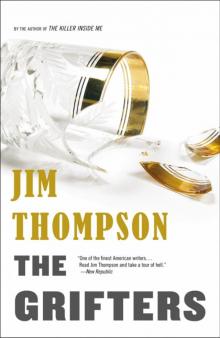 The Grifters
The Grifters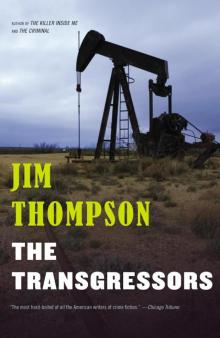 The Transgressors
The Transgressors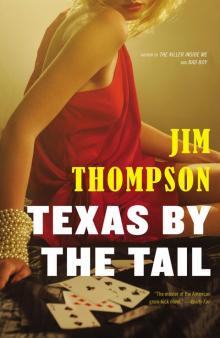 Texas by the Tail
Texas by the Tail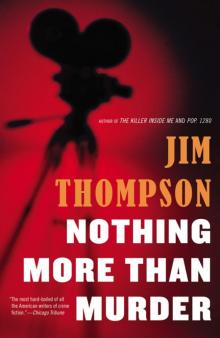 Nothing More Than Murder
Nothing More Than Murder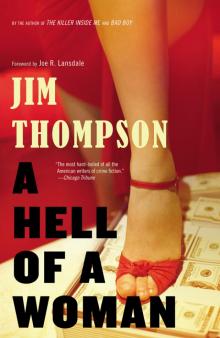 A Hell of a Woman
A Hell of a Woman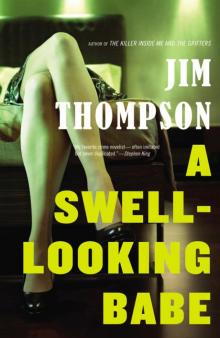 A Swell-Looking Babe
A Swell-Looking Babe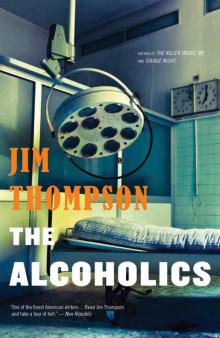 The Alcoholics
The Alcoholics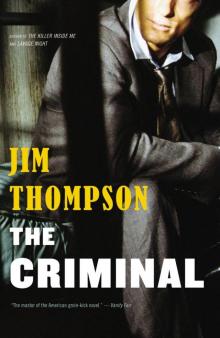 The Criminal
The Criminal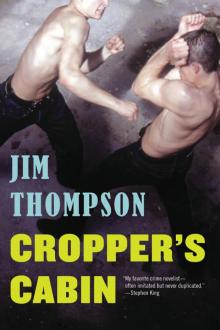 Cropper's Cabin
Cropper's Cabin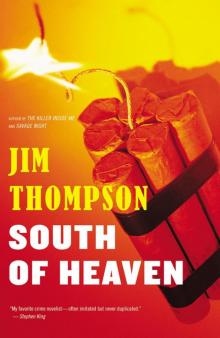 South of Heaven
South of Heaven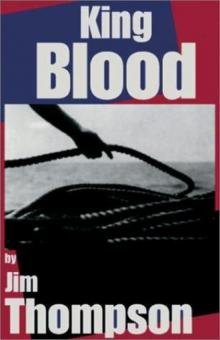 King Blood
King Blood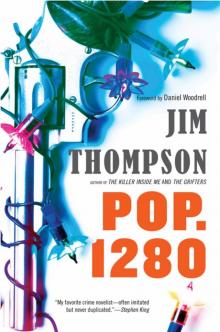 Pop. 1280
Pop. 1280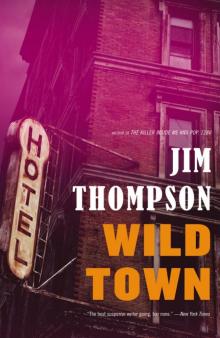 Wild Town
Wild Town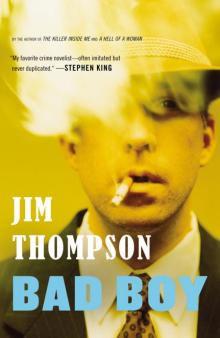 Bad Boy
Bad Boy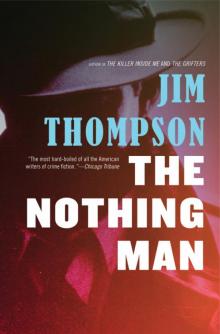 The Nothing Man
The Nothing Man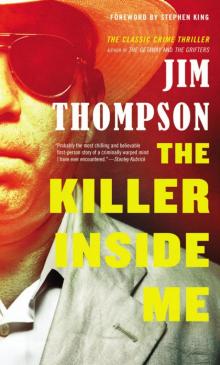 The Killer Inside Me
The Killer Inside Me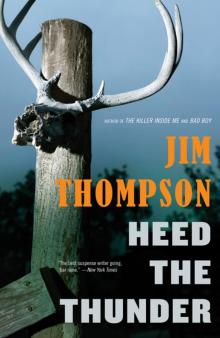 Heed the Thunder
Heed the Thunder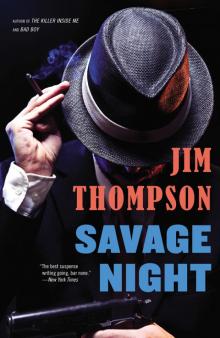 Savage Night
Savage Night Recoil
Recoil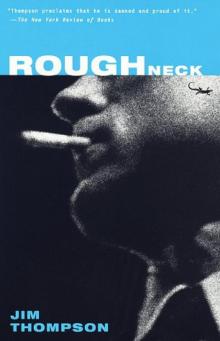 Roughneck
Roughneck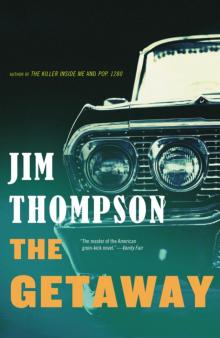 The Getaway
The Getaway